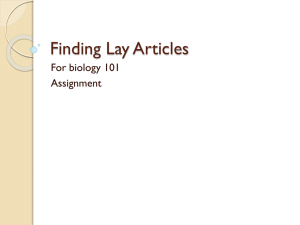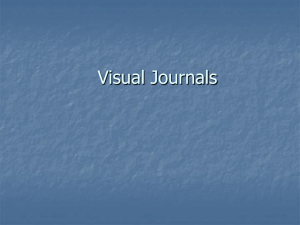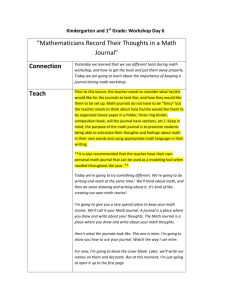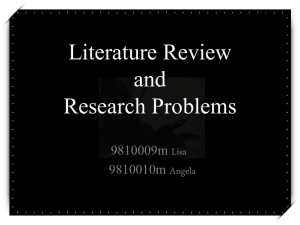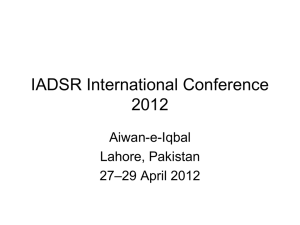Abstract and Indexing
advertisement
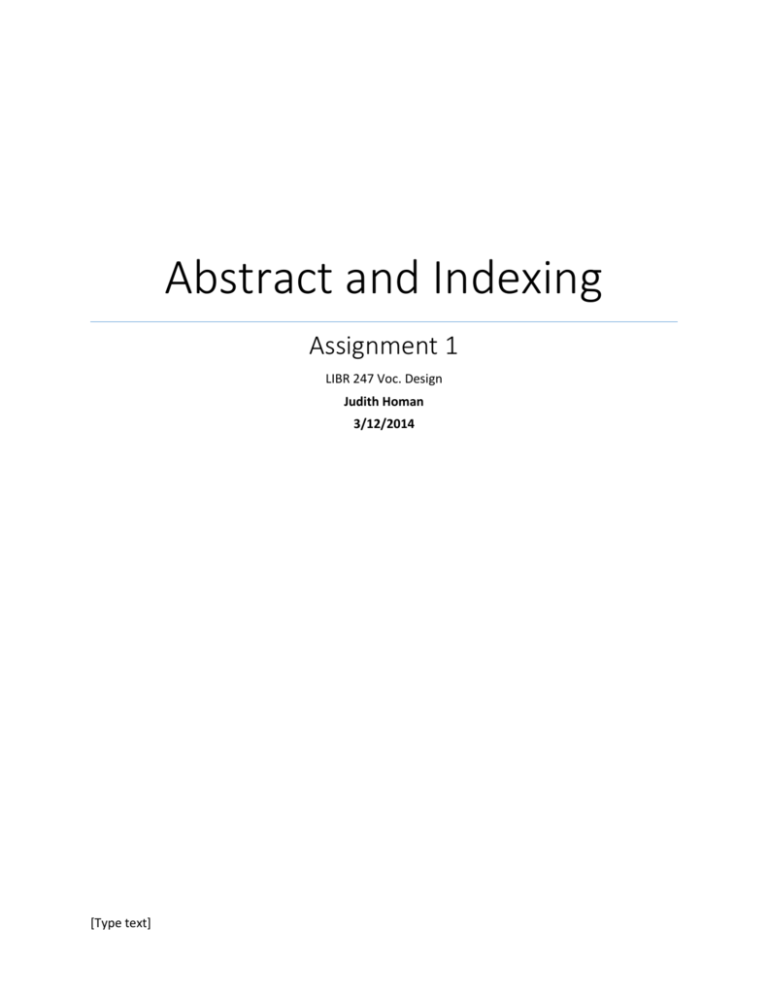
Abstract and Indexing Assignment 1 LIBR 247 Voc. Design Judith Homan 3/12/2014 [Type text] My subject areas with ERIC Thesaurus Descriptor - Electronic Journal BT – Periodical RT - Electronic Publishing Online Systems Descriptor - Academic Libraries BT – libraries NT – College Libraries Descriptor - Librarians BT - Information Scientists Library Personnel Evaluation NT – Computer Software Evaluation Equipment Evaluation Institutional Evaluation Instructional Material Evaluation Needs Assessment Program Evaluation Descriptor - Higher Education BT - Postsecondary Education NT - Graduate Study Postdoctoral Education Undergraduate Study Descriptor - Databases BT - Data Information Sources NT - Bibliographic Databases Online Catalogs Consortiums – Eric uses Consortia BT – Organizations (groups) Use this term instead of Consortiums Judith Homan – LIBR 247 – Assignment 1 Identifier – Serial Librarian Library Promotion Library marketing Library Management Library suppliers/publishers Location – UK Location - North America My Abstract - Research on the use of electronic journals in an academic library reveals some areas that still need more attention focused on the results. Academic Librarians looking at the statistics from the usage of electronic journals see that there is a weakness in the areas of promotion and evaluation of the services provided. Along with a need for more educational training of both library staff and library users to help promote existing services. The academic libraries included in this research were located in North America and in the U.K. Academic librarians need to work on the relationship with library supplies and publishers to seek current training and information about databases for their users. Judith Homan – LIBR 247 – Assignment 1 ERIC Citation Electronic Journals: Managing and Educating for a Changing Culture in Academic Libraries. Author(s): Ashcroft, Linda; McIvor, Stephanie Source: Online Information Review, v25 n6 p378-87 2001. Peer Reviewed: Yes ISSN: 1468-4527 Descriptors: Academic Libraries, Consortia, Costs, Electronic Journals, Evaluation Methods, Foreign Countries, Higher Education, Library Materials, Publishing Industry, Scholarly Journals, Serials, Higher Education Identifiers: Change Analysis, Interoperability, North America, United Kingdom Abstract: Describes a research project that focused on the evaluation and promotion of electronic journals in academic libraries in the United Kingdom and in North America. Topics include changing role of the serials librarian; costs; consortia purchasing; relationship between libraries and publishers; and collaboration to ensure interoperability. (Author/LRW) Publication Type: Journal Articles; Reports - Research Availability: Journal Code: CIJAUG2002 Entry Date: 2002 Accession Number: EJ643417 Citation from the article with abstract Electronic journals: managing and educating for a changing culture in academic libraries Author(s): Linda Ashcroft, (Linda Ashcroft is Senior Lecturer and MA Programme Leader at the Centre for Information and Library Management at Liverpool Business School, Liverpool John Moores University, Liverpool, UK.), Stephanie McIvor, (Stephanie McIvor is Researcher at Liverpool Business School, Liverpool John Moores University, Liverpool, UK.) Citation: Linda Ashcroft, Stephanie McIvor, (2001) "Electronic journals: managing and educating for a changing culture in academic libraries", Online Information Review, Vol. 25 Iss: 6, pp.378 - 388 Keywords: Evaluation, Information technology, Journal publishing, Librarians, Promotion Title: Judith Homan – LIBR 247 – Assignment 1 Article type: DOI: Publisher: Abstract: Case study 10.1108/EUM0000000006537 (Permanent URL) MCB UP Ltd With the requisite IT infrastructure now becoming commonplace in academic institutions, electronic journals are becoming an established component of academic life, but the management of electronic journals can not yet be considered trouble-free. This latest research project at Liverpool John Moores University focuses on the evaluation and promotion of electronic journals in academic libraries in the UK and in North America. The aim is to highlight any significant differences in the way that electronic journals are managed and to identify successes in order to establish “best practice”. Several issues emerge from the research. For electronic journals to become a significant alternative to the print version, there needs to be a recognition that the introduction of electronic journals will impact on working practices and staffing requirements, requiring more technical skills and competencies and changes in management priorities. Furthermore, electronic journals are still a “moving target”, making realignment even more difficult and posing awkward questions for decision makers as to the best way forward. The whole process of electronic journal development requires effective management of change. Interoperability would seem to provide the key to many of the issues involved. All of these factors influence the changing arena of LIS education. - See more at: http://www.emeraldinsight.com.libaccess.sjlibrary.org/journals.htm?issn=14684527&volume=25&issue=6&articleid=862171&show=abstract&PHPSESSID=o2quesloer4jt9b8 ut3nld6fk7#sthash.9uOlyw76.dpuf Judith Homan – LIBR 247 – Assignment 1 Critique – Looking back at the article “Electronic journals: managing and educating for a changing culture in academic libraries,” the choices I made in selecting terms seemed to be logical. As I read through the article I underlined subjects that kept repeating throughout the article. The terms were ones that I have read about before such as “library management” and “serial librarians.” When I compared these terms to the thesaurus in ERIC they were not found. The terms management and librarians were in the thesaurus, but as a novice at this neither term directed me towards the library side of the terms. So this left me with the question, how do you get specific information towards certain topics? The ERIC thesaurus directed me toward “using this term instead of that term” for subjects like consortiums, the term consortia is to be used instead. I was able to understand that since consortia is the plural form of the word. I found reference librarian but not serial librarian, is this due to the frequency in which terms are used? So many questions when looking at my subject selections. When I looked at the terms used in both ERIC and by the authors of the article I was surprised by the differences rather than the similarities. The articles authors listed the keywords as: Librarians, Promotions, Evaluation, Information technology, and journal publishing. Of these five terms I only duplicated three, librarians, promotions and evaluation. In ERIC’s descriptors the terms used were: Academic Libraries, Consortia, Costs, Electronic Journals, Evaluation Methods, Foreign Countries, Higher Education, Library Materials, Publishing Industry, Scholarly Journals, and Serials. This list of eleven descriptors I duplicated four complete terms, but I had partial terms like evaluation methods, I had evaluations and serials I had serial librarians. The serials confused me because I entered serials into the ERIC thesaurus when I was looking for serial librarian, but even serials did not show up in ERIC. What am I missing on the Judith Homan – LIBR 247 – Assignment 1 terms? The terms were search for broader terms and related terms. No suggestions were made for serials. The ERIC thesaurus made it easy to select terms, especially if you selected a term that was no longer used, it gave you a “use this instead of that” which allowed you to selected other terms. The related terms that were listed gives you other terms to consider. I found this to be very useful when trying to select the correct term. The browse feature allows the searcher to select the area or field to search. I liked the ERIC descriptors better than my subject terms. I did not look at some of the terms for my selection, such as cost. While cost was mentioned in the article I did not see it playing a major role. Another term used was evaluation methods. I used evaluation but did not narrow it down to methods. The same is true for publishing industry, I used library suppliers/publishers instead of industry. I am not sure how the only two countries mentioned in the article, the UK and North America would lead to the term foreign countries. Would this not be a place that UK and North America are used instead of foreign countries? The term I liked but it never crossed my mind to use was library materials. This term covers several of the items mentioned in the article with one term. The ERIC terms gave a good listing but it seems two items were overlooked, the promotion of library services and library management. These two items were mentioned repeatedly in the article. These terms were not found in the thesaurus but not sure if they are part of another term. The article’s keywords does use promotion and evaluation, but not electronic journals. The two listing of terms together hit all the key points of the article. I will admit at first I thought the two abstracts were redundant, but after reading both it gave a complete picture of what the article is really about. My abstract was not as detailed as the articles, but seemed to have more Judith Homan – LIBR 247 – Assignment 1 information than ERICs abstract. I am not sure my abstract is correct, but it does appear to cover more information. ERIC’s abstract gave simple information, but instead gave the listing of the descriptors as part of the abstract. The article’s abstract give a great overview of the article, but again it leaves out promotion and evaluation. These two items were a major part of the overall concept of the article. I may have over rated these two terms, but to me they seemed to be an important point in the article. Overall I think the guidelines were understandable. I am not completely comfortable with indexing items, but I think it is a process that will continue to improve as I do it more often. The information is there between the lecture notes, and the textbooks, but I find myself hunting for items, and do not always know exactly what I am looking for at times. Working through the subjects or descriptors I do not know if I covered those correctly. I read the article several times, and went through and underline terms that stood out or were repeated several times throughout the article. I then went back to look at the words I underlined, and found some terms could be covered by a broader term. I noticed some terms I selected did not fit the descriptor term but instead they fit the facet analysis of space or where. The location of UK or North America fell into this section. This is the section of the assignment I am unsure if I did it correct. As I go back and review the assignment, I worry that I am still missing the descriptors and identifiers. Since the terms I used differ from the article and ERIC. Judith Homan – LIBR 247 – Assignment 1 References Ashcroft, L., & McIvor, S. (2001). Electronic Journals: Managing and Educating for a Changing Culture in Academic Libraries. Online Information Review, 25(6), 378-87. Cleveland, D., & Cleveland A. (2013) Introduction to Indexing and Abstracting. Santa Barbara, CA: Libraries Unlimited. ERIC Thesaurus. http://eric.ed.gov/? Judith Homan – LIBR 247 – Assignment 1
